
Nick Dunn is Professor of Urban Design and Executive Director of Imagination, the design and architecture research lab at Lancaster University, UK. He is the founding Director of the Dark Design Lab, exploring the impacts of nocturnal activity on humans and non-humans. Nick has worked with the Alliance for Healthy Cites, Design Council European Commission, International Dark-Sky Association, and World Health Organisation. He has authored numerous books, curated exhibitions, and given talks at public festivals and conferences around the world.

Rachel Cooper OBE is Distinguished Professor of Design Management and Policy at Lancaster University, UK. Her research has focused on the future of cities and human and planetary wellbeing. She was a Lead Expert for the UK Government Foresight programme on the Future of Cities, was on the UK Academy of Medical Sciences Working group addressing ‘The Health of the Public 2040’.

Before working in national research policy and funding, Dr Geoff Hill was a researcher and consultant in palaeoecology & archaeoentomology, being awarded his PhD at Queens University Belfast. His career change started at the Higher Education Funding Council of England (HEFCE) where, alongside working on EDI and Open Access policy, he started developing the Expanding Excellence in England (E3) fund. Launching this fund when Research England (RE) arose out of HEFCE, Geoff went on to work in international development research funding in central UKRI before returning to RE, and ultimately developing the second round of E3.
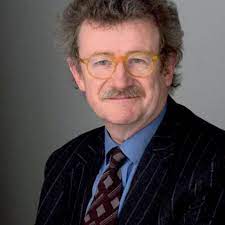
Professor Christopher Frayling is an award-winning writer and broadcaster, and former Rector of the Royal College of Art as well as former Chair of Arts Council England, the Design Council and the Crafts Study Centre. A regular contributor to BBC Radio 4, he has published twenty-six books – among the latest being Craftsmanship – towards a new Bauhaus and The Ken Adam Archive – the art of production design, and he has curated exhibitions at, among other venues, the V&A, the RCA, the Museo Nazionale del Cinema in Turin,and the Autry Museum in Los Angeles. He was knighted in 2000 for “services to art and design education”.
Designing for health and wellbeing panellists

Emmanuel Tsekleves is a professor of Global Health Design Innovation at Lancaster University and Co-Director of the Future Cities Research Institute. Emmanuel has established the field of global health design, directing the first international research group (Design Research Society Global Health Special Interest Group) and books (Routledge Design for Health, Design for Global Challenges and Design for Dementia), setting new research agendas He leads international research in design for global and planetary health.

Dr. Shaila Afroj is a Senior Research Fellow for Novel Print Processes and Materials (Graphene) at the Centre for Fine Print Research (CFPR), UWE Bristol (UK). The main scope of her research is investigating into graphene and other 2D materials-based technologies aimed at developing scalable and cost-effective next generation functional and wearable textiles. Her current research interest includes exfoliation and functionalisation of graphene and other nanomaterials, and their formulations to be used for highly scalable fabrication techniques such as coating and printing for high-performance multi-functional products, and flexible wearable electronics applications.

Dr. Claire Craig is Professor of Design and Creative Practice in Health and Co-Director of Lab4Living, Sheffield Hallam University. Her interests and research focuses on the role of design, arts and creative practice in promoting quality of life and wellbeing, particularly in the context of people living with dementia and their families. She has developed a number of award winning products and interventions to support individuals at different stages of their diagnosis creating outlets for self-expression and valued meaningful activity. She has received the ROMPA Quality of Life Award in relation to this work.
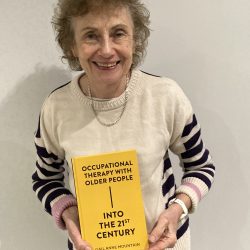
Responder: Gail Mountain is a researcher and an occupational therapist. Her work has focussed upon how people can be assisted to age well through health promotion and rehabilitation and by harnessing the benefits of good design and technological advances. She recently published a book “Occupational Therapy with Older People into the 21st century” which uses best evidence including the views of older people to describe how the profession can respond to the needs of an ageing population both now and in the future.
Designing for net zero futures panellists

Mike Stead’s current research applies and advances approaches including Research through Design and Speculative Design to prototype and evaluate radical new visions for low carbon futures which critically and creatively interrogate the evolving relationship between emerging data-driven technologies and key sustainability challenges such as Net Zero 2050 and the Circular Economy.

Tavs Jorgensen is Associate Professor at the Center For Print Research, Univerisity of the West of England, Bristol. Jorgensen has a brackground the ceramic industry where he worked as designer before developing a career in academia. He joined the CFPR in 2017 having previously worked for the University of Plymouth. Prior to this post he taught for more than 10 years at the Royal College of Art and was also a Research Fellow at the Autonomatic Research Cluster at University College Falmouth which is widely recognised for pioneering research into the use of digital tools in design and craft practice.

Ben Bridgens is Professor of Regenerative Architecture at Newcastle University and Co-Director of the Hub for Biotechnology in the Built Environment. Ben’s work is driven by the question: “Can we move beyond ‘sustainability’ and create a built environment which has positive impacts: that is beneficial and enriching to the natural environment, that does not degrade but performs better as it ages, that is a pleasure to construct, and is delightful to inhabit?” Ben works at the interface of structural engineering, architecture and design, critically examining ‘sustainable’ technologies and exploring the potential for combining traditional construction practices with biotechnology and natural systems to go beyond sustainability and create a regenerative built environment.
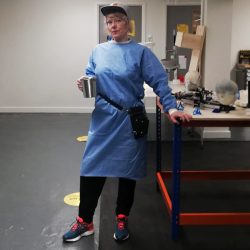
Dr. Kaisu Koski is a cross-disciplinary artist working with performance, moving image, and biological materials. Her work focuses on planetary health, multispecies justice, and the art-science methodology. She has previously conducted fellowships in medical schools in North America and Europe and developed films for medical curricula on topics such as vaccine-hesitancy and breaking bad news. In 2020, Kaisu founded the Citizen Surgery Collective, a practice-based research group consisting of artists, critical posthumanists, and anthropologists. Their work concerns surgical literacy, sensory skills acquisition, and the relationship between (non)human animal bodies and food. Kaisu is an associate professor of art and design at Lab4Living, Sheffield Hallam University.
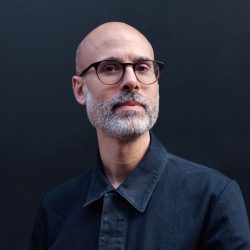
Responder: Justin McGuirk is the director of Future Observatory, the national design research programme for the green transition, and the former chief curator of the Design Museum. A writer and curator, he has produced numerous high-profile exhibitions and publishing projects. In 2012 he was awarded the Golden Lion at the Venice Biennale of Architecture for an exhibition he curated with Urban Think Tank. He was also the founding Head of the Design Curating and Writing MA at Design Academy Eindhoven. He has lectured at universities and conferences around the world, and his writing has appeared in the New Yorker, the Guardian, e-flux and numerous art and design journals. He is the author or editor of several books, including Radical Cities: Across Latin America in Search of a New Architecture (Verso, 2014).
Designing across disciplines panellists

Paul Chamberlain is Professor of Design at Sheffield Hallam University, founder and co-director of the design led interdisciplinary research group Lab4Living www.lab4living.org.uk/ His interest lies in designing and developing tools and methods to encourage and engender social innovation applied with a focus on healthcare, disability and ageing. His current research focus is the role of Design in the re-conceptualisation of the 100-year life and the ‘future home’. He has led major interdisciplinary projects securing over £10m from diverse funding sources. His applied research has led to international exhibitions, commercialisation of numerous products and design awards. He was panel member (Art & Design, History, Practice and Theory) for the UK’s HEFCE Research Excellence Framework 2021.

Dr Paul Cureton FRSA is Director of Post-Graduate Research, LICA, Director of The School of Design and Senior Lecturer in Design at ImaginationLancaster, and a member of the Data Science Institute (DSI) Lancaster University. His work transcends subjects in spatial planning, 3D GIS modelling and design futures. It is at the forefront of exploring the critical interface of new and emerging socio-technological relationships such as Design for Digital Twins, Drone Futures and novel process-based methodologies for Future Environments such as Geodesign and XR interactions.

Dr Jane Scott leads The Living Textiles Research Group in the Hub for Biotechnology in the Built Environment at Newcastle University. Her interdisciplinary research is located at the interface of programmable materials, knitted fabric design, architecture and biology. Her research positions textiles as a critical biofabrication strategy in the transition to sustainable and circular construction. Her group enables interdisciplinary research collaborations with experts from design, science and industry, leading to innovation across scales and applications. Her work has been exhibited internationally including recently in The Design Museum, London, The Farrell Centre, Newcastle and the Saint Etienne Design Biennale.
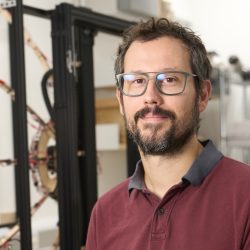
Dr Xavier Xure is a Research Fellow at the Centre for Print Research (CFPR) at the University of the West of England in Bristol, specialising in 3D imaging of cultural heritage objects. He completed his PhD at the CFPR, focusing on the application of 2.5D and 3D technologies to the conservation and presentation of paintings. His current research involves developing practical workflows and custom scanning systems for creating high-resolution digital assets for scientific documentation, public engagement, and tactile interaction for the visually impaired.

Responder: Dr Carinna Parraman is Professor of Design, Colour and Print and Director of the Centre for Print Research, at the University of the West of England, Bristol. She is PI of the Research England (E3) Unit and leads a cross-disciplinary research team comprising expertise including scientists and technologists, designers and artists. The CFPR group are exploring the future of printing and fabrication, new ways of thinking and working alongside traditional methods of making. Her work spans art and science, including colour mixing, colour printing, novel pigments and halftoning, texture appearance and photomechanical printing processes. She collaborates with different sectors, including industry, heritage and fine art print.